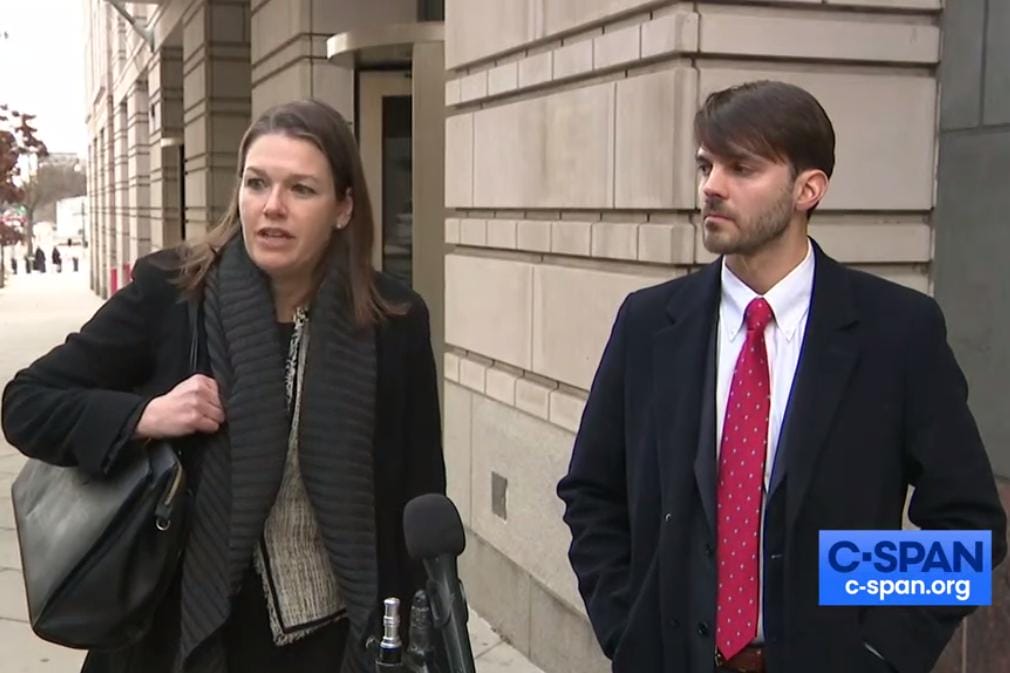The Editorial Board disapproves of Littlejohn for political reasons.
I was surprised earlier this week to see my name in an opinion piece by the Wall Street Journal’s Editorial Board. According to a tracker compiled by the American Economic Liberties Project, it’s been over a month since the newspaper published a screed about outgoing FTC Chair Lina Khan, so naturally, I was expecting to see yet another complaint about the regulator who transformed a once-dormant agency into a strong antitrust enforcer.
The Editorial Board is disgusted that progressives are calling on President Biden to commute the sentence of Charles Littlejohn. He’s the IRS contractor who leaked the tax returns of Donald Trump, Elon Musk, Jeff Bezos, George Soros, Bill Gates, and other super-wealthy tax dodgers to the New York Times and ProPublica, resulting in revelatory reporting about the scope of tax injustice in the United States (maybe the WSJ is jealous they were passed over?). Last month, the Revolving Door Project and Patriotic Millionaires launched a website, freecharleslittlejohn.com, to make it easier for people to urge Biden to grant Littlejohn clemency.
The Editorial Board scoffs at my description of Littlejohn as “a selfless defender of tax fairness and democracy.” (For the record, that line comes from a piece I co-wrote with Bob Lord, Associate Fellow at the Institute for Policy Studies and Senior Vice President for Tax Policy at Patriotic Millionaires.) The Board claims that Littlejohn released tax records for “political reasons.”
Political, yes, but not partisan. There are prominent Democrats as well as Republicans featured in the ProPublica reporting that relied on Littlejohn’s whistleblowing. Republicans are more committed than Democrats to making the tax system as unfair as possible, but that doesn’t mean Littlejohn was acting out of anti-GOP spite. Rather, he was trying to preserve what’s left of the United States’ fast-disappearing democracy.
To be clear, intensifying wealth inequality—enabled and exacerbated by the tax avoidance of the ultra-rich—is an existential threat to government of, by, and for the people. That Musk, who’s likely to be a trillionaire before long if current trends continue, was able to buy a seat in the White House (and at basically every department and agency across the government to boot, including a pal running NASA) exemplifies how anti-democratic the U.S. has become. Littlejohn gave us a better understanding of how dangerous existing taxation arrangements are. If the WSJ thinks it’s fine that certain billionaires pay $0 in income tax some years, that Warren Buffet pays less in taxes than his secretary, that the top 0.0001% pays a lower effective tax rate than working-class Americans, then the Editorial Board should just come out and say that it favors government of, by, and for capital. Despite Trump’s frequently economically populist rhetoric, his billionaire cabinet and his incoming administration’s fealty to corporations shows that we’re well on our way. Is the Board’s not-so-subtle defense of plutocracy somehow apolitical?
If Biden’s recent warning about an oligarchy taking hold is sincere (a big if, given other recent actions he’s taken as well as the full arc of his political career), then he should prove it by commuting Littlejohn’s sentence.
The Editorial Board implies that the left is wrong to argue that Littlejohn has already served enough time behind bars. Some fact-checking is necessary here. The five-year sentence Littlejohn received is six times longer than the maximum sentence recommended in federal guidelines. If Littlejohn had gotten a 10-month sentence, he would be leaving prison at the end of February. So yes, he has spent more than enough time locked up.
That’s especially true when taking into account how Littlejohn’s actions served the public interest. I know the Editorial Board is not persuaded by this argument (because billionaires are dutifully “paying the taxes they owe, not the taxes the left thinks they should owe”). But I’m not persuaded by Judge Ana Reyes’ argument, cited by the Board, that Littlejohn’s actions were “an intolerable attack on our constitutional democracy.” For reasons I’ve already explained, Littlejohn’s actions should be interpreted as a desperate (and yes, selfless) effort to slow this country’s descent into a full-fledged capitalist dictatorship. He put his liberty at risk to defend the possibility of U.S. democracy.
Reyes’ harsh sentencing came after House Republicans implored her to throw the book at Littlejohn. By comparison, federal judges have treated rich people convicted of tax evasion, people convicted of leaking other types of data, and January 6 insurrectionists—who engaged in a deadly assault on our democratic institutions—with kid gloves. It’s remarkable that while demanding a prolonged incarceration for Littlejohn, the Editorial Board failed to denounce Trump’s promise to pardon convicted rioters. Why does participating in a coup attempt merit more leniency than responsibly disclosing to reputable news organizations evidence about how elites are hoarding a society and planet-distorting amount of wealth and political power?
Finally, the Editorial Board suggests that it is motivated by a desire to protect the privacy of Trump and other taxpayers. First of all, it’s not like Littlejohn indiscriminately posted people’s information to the web. He shared it with journalists, including WSJ alumni, who treated it with care. Second, is transparency not also valuable? Trump was the first sitting president in U.S. history to refuse to disclose his tax returns. Why shouldn’t candidates for public office be required to publish their tax records? The electorate has a right to know if would-be elected officials are effectively stealing from the public through tax avoidance.
It’s noteworthy that in some countries, tax information is made readily available to the public. That would be a surefire way to prevent future Charles Littlejohns. Since the Editorial Board and other right-wingers are so concerned about deterrence, they should support such a reform. But they won’t. Why? Because those countries with greater levels of transparency about inequality are far more egalitarian (and democratic, too). And what Littlejohn’s detractors really want is continued secrecy, because that aids and abets the extreme inequality they foolishly support.

